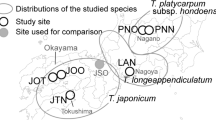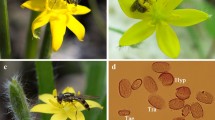Abstract
The deposition of incompatible pollen grains in the stigma can interfere with the performance of compatible pollen grains and compromise the reproductive success of the species in the community. Ipomoea asarifolia, a self-incompatible species, occurs in sympathy with I. brasiliana, sharing pollinators, but without hybrid formation. However, this condition favors the deposition of auto pollen and interspecific pollen in the stigma, which can compromise the reproductive success of the species in the community. Given this, we investigated the influence of incompatible intra- and interspecific pollen grains on their reproductive success of I. asarifolia, based on analyses of natural pollination and controlled experiments. Our hypothesis is that the presence of incompatible pollen grains in the stigma negatively interferes with the formation of fruits and seeds in I. asarifolia. Fruit yield was significantly higher in manual cross-pollination than in natural pollination and mixed pollination experiments of compatible (intraspecific: cross-pollinated pollen) and incompatible (intraspecific: self-pollen and interspecific: pollen of I. brasiliana) pollens. Seed yield was significantly higher in cross-pollination than between the two mixed pollination experiments. Seed production was not significantly different between cross-pollination and natural pollination, nor between natural pollination and mixed pollination experiments. However, fruit and seed production was higher in cross-pollination than in other situations. And experiments with incompatible amounts of pollens do not form fruits. Few fruits and seeds are formed in the presence of incompatible pollens (intra and interspecific), which may be interfering with reproductive success in I. asarifolia, especially in the long term. We reinforce the importance of the selection of reproductive displacement in the species to minimize the flow of incompatible pollens and their reproductive interferences.
Similar content being viewed by others
Data availability statement
The original contributions presented in the study are included in the article. Other questions can be directed to the corresponding author.
References
Aizen MA (2006) Habitat fragmentation, pollinator decline and plant pollination. In: Kevan PG, Imperatriz-Fonseca V (eds) Pollinating bees: the conservation link between agriculture and nature. Ministry of Environment, MMA, Brasília, pp 291–292
Arceo-Gómez G, Ashman T (2011) Heterospecific pollen deposition: Does diversity alter the consequences? New Phytol 192:738–746. https://doi.org/10.1111/j.1469-8137.2011.03831.x
Baack E, Melo MC, Rieseberg LH, Ortiz-Barrientos D (2015) The origins of reproductive isolation in plants. New Phytol 207:968–984. https://doi.org/10.1111/nph.13424
Barrett SCH, Harder LD (1996) Ecology and evolution of plant mating. Trends Ecol Evol 11:73–79. https://doi.org/10.1016/0169-5347(96)81046-9
Briggs HM, Atalla ALM, LM, Delva AM, Dobbs EK, Brosi BJ, (2016) Heterospecific pollen deposition in Delphinium barbeyi: linking stigmatic pollen loads to reproductive output in the field. Ann Bot 117:341–347. https://doi.org/10.1093/aob/mcv175
Brown BJ, Mitchell RJ (2001) Competition for pollination: effects of pollen of an invasive plant on seed set of a native congener. Oecologia 129:43–49. https://doi.org/10.1007/S004420100700
Campbell DR (1985) Pollen and gene dispersal: the influences of competition for pollination. Evolution 39:418–431. https://doi.org/10.1111/j.1558-5646.1985.tb05678.x
Campbell LG, Snow AA, Sweeney PM (2009) When divergent life histories hybridize: insights into adaptive life-history traits in an annual weed. New Phytol 184:806–818. https://doi.org/10.1111/j.1469-8137.2009.03036.x
Caruso CM, Alfaro M (2000) Interspecific pollen transfer as a mechanism of competition: effect of Castilleja linariaefolia pollen on seed set of Ipomopsis aggregata. Can J Bot 27:221–238. https://doi.org/10.1139/b00-034
Cheptou PO, Avendaño VLG (2006) Pollination processes and the Allee effect in highly fragmented populations: consequences for the mating system in urban environments. New Phytol 172:774–783. https://doi.org/10.1111/j.1469-8137.2006.01880.x
Correia BEF, De Almeida EB, Zanin M (2020) Key points about north and northern Brazilian restinga: a review of geomorphological characterization, phytophysiognomies classification, and studies’ tendencies. Bot Rev 86:329–337. https://doi.org/10.1007/s12229-020-09230-2
Coyne JA, Orr HA (2004) Speciation. Sinauer, Sunderland
Da Silva EM, Sargent RD (2011) The effect of invasive Lythrum salicaria pollen deposition on seed set in the native species Decodon verticillatus. Botany 89:141–146. https://doi.org/10.1139/B11-001
Dickinson GR, Lee DJ, Wallace HM (2012) The influence of pre- and post-zygotic barriers on interspecific Corymbia hybridization. Ann Bot 109:1215–1226. https://doi.org/10.1093/aob/mcs050
Fishman L, Wyatt R (1999) Pollinator-mediated competition, reproductive character displacement, and the evolution of selfing in Arenaria uniflora (Caryophyllaceae). Evolution 53:1723–1733. https://doi.org/10.1111/j.1558-5646.1999.tb04557.x
Galen C, Gregory T (1989) Interspecific pollen transfer as a mechanism of competition: Consequences of foreign pollen contamination for seed set in the alpine wildflower, Polemonium viscosum. Oecologia 81:120–123. https://doi.org/10.1007/bf00377020
Hopkins R (2013) Reinforcement in plants. New Phytol 197:1095–1103. https://doi.org/10.1111/nph.12119
Howard DJ (1999) Conspecific sperm and pollen precedence and speciation. Annu Rev Ecol Evol Syst 30:109–132. https://doi.org/10.1146/annurev.ecolsys.30.1.109
Jakobsson A, Padron B, Traveset A (2008) Pollen transfer from invasive Carpobrotus spp. to natives—a study of pollinator behaviour and reproduction success. Biol Cons 141:136–145. https://doi.org/10.1016/j.biocon.2007.09.005
Kawagoe T, Suzuki N (2005) Self-pollen on a stigma interferes with outcrossed seed production in a self-incompatible monoecious plant, Akebia quinata (Lardizabalaceae). Funct ecol 19:49–54. https://www.jstor.org/stable/3599270
Kiill PLH, RangA NT (2003) Ecologia da polinização de Ipomoea asarifolia (Ders.) Roem. & Schult. (Convolvulaceae) na região semi-árida de Pernambuco. Acta Bot Bras 17:355–362. https://doi.org/10.1590/S0102-33062003000300003
Mangiafico S (2020) Functions to Support Extension Education Program Evaluation. R package rcompanion version 2.4.21. https://CRAN.R-project.org/package=rcompanion
Marinho AM, Jardim JG, Buril MT (2021) Convolvulaceae na APA Jenipabu, Rio Grande do Norte, Brasil. Rodriguésia 72:1–12. https://doi.org/10.1590/2175-7860202172001
Miller RE, Buckley TR, Manos PS (2002) An examination of the monophyly of morning glory taxa using Bayesian phylogenetic inference. Syst Biol 51:740–753. https://doi.org/10.1080/10635150290102401
Morales CL, Traveset A (2008) Interspecific pollen transfer: magnitude, prevalence and consequences for plant fitness. Crit Rev Plant Sci 27:221–238. https://doi.org/10.1080/07352680802205631
Moreira-Hernández JI, Muchhala N (2019) Importance of pollinator-mediated interspecific pollen transfer for angiosperm evolution. Annu Rev Ecol Evol Syst 50:191–217. https://doi.org/10.1146/annurev-ecolsys-110218-024804
Muñoz-Rodríguez P, Carruthers T, Wood JR, Williams BR, Weitemier K, Kronmiller B, Goodwin Z, Sumadijaya A, Anglin NL, Filer D, Harris D, Rausher MD, Kelly S, Liston A, Scotland RW (2019) A taxonomic monograph of Ipomoea integrated across phylogenetic scales. Nat Plants 5:1136–1144. https://doi.org/10.1038/s41477-019-0535-4
Murphy SD, Aarsen LW (1995) Reduced seed set in Elytrigia repens caused by allelopathic pollen from Phleum pratense. Can J Bot 73:1417–1422. https://doi.org/10.1139/b95-154
Navarro L, Ayensa G, Ferrero V, Sánchez JM (2012) The avoidance of self-interference in the endemic daffodil Narcissus cyclamineus (Amaryllidaceae). Plant Ecol 213:1813–1822. https://doi.org/10.1007/s11258-012-0137-y
Norton NA, Fernando MTR, Herlihy CR, Busch JW (2015) Reproductive character displacement shapes a spatially structured petal color polymorphism in Leavenworthia stylosa. Evolution 69:1191–1207. https://doi.org/10.1111/evo.12659
NUC-IDEMA—Núcleo de Unidades de Conservação do Rio Grande do Norte (2009) Plano de Manejo da área de proteção ambiental—APA de Jenipabu, Núcleo de Unidades de Conservação, Natal–RN, pp 177
Ortiz-Barrientos D, Grealy A, Nosil P (2009) The genetics and ecology of reinforcement: implications for the evolution of prezygotic isolation in sympatry and beyond. Ann N Y Acad Sci 1168:156–182. https://doi.org/10.1111/j.1749-6632.2009.04919.x
Otárola MF, Rocca MA (2014) Flores no tempo: a floração como uma fase da fenologia reprodutiva. In: Rech AR, Agostini K, Oliveira EP, Machado IC (orgs.). Biologia da polinização, Projeto Cultural, Rio de Janeiro, pp 114–126
Parra-Tabla V, Bullock SH (2005) Ecological and selective effects of stigma-anther separation in the self-incompatible tropical tree Ipomoea wolcottiana (Convolvulaceae). Pl Syst Evol 252:85–95. https://doi.org/10.1007/s00606-00402557
Pfennig DW, Pfennig KS (2010) Character displacement and the origins of diversity. Am Nat 176:S26–S44. https://doi.org/10.1086/657056
Radford AE et al (1974) Vascular plant systematics. Harper & Row Publishers, New York, p 891
Randle AM, Spigler RB, Kalisz S (2018) Shifts to earlier selfing in sympatry may reduce costs of pollinator sharing. Evolution 72:1587–1599. https://doi.org/10.1111/evo.13522
Rathcke B (1983) Competion and facilitation among plants for pollination. In: Real L (ed) Pollination biology. Academia Press, INC., Harcourt Brace Jovanovich, Publishers, North Carolina, pp 305–325
Rathcke B, Real L (1993) Autogamy and inbreeding depression in mountain laurel, Kalmia latifolia (Ericaceae). Am J Bot 80:143–146. https://doi.org/10.1002/j.1537-2197.1993.tb13781.x
Rieseberg LH, Desrochers AM, Youn SJ (1995) Interspecific pollen competition as a reproductive barrier between sympatric species of Helianthus (Asteraceae). Am J Bot 82:515–519. https://doi.org/10.1002/j.1537-2197.1995.tb15672
Runquist RB, Stanton ML (2013) Asymmetric and frequency dependent pollinator-mediated interactions may influence competitive displacement in two vernal pool plants. Ecol Lett 16:183–190. https://doi.org/10.1111/ele.12026
Santos BYM (2023) Isolamento reprodutivo entre espécies sincronopátricas de Ipomoea L. em uma área de Restinga no Rio Grande do Norte. PhD Thesis. Universidade Federal Rural de Pernambuco, Brazil
Signorell A (2023). DescTools: tools for descriptive statistics. R package version 0.99.48. https://CRAN.R-project.org/package=DescTools
Thomson JD, Andrews BJ, Plowright RC (1981) The effec to fforeign pollen on ovule development in Diervilla lonicera (Caprifoliaceae). New Phytol 90:777–783. https://doi.org/10.1111/j.1469-8137.1982.tb03286.x
Waser NM, Fugate ML (1986) Pollen precedence and stigma closure: a mechanism of competition for pollination between Delphinium nelsonii and Ipomopsis aggregata. Oecologia 70:573–577. https://doi.org/10.1007/BF00379906
Webb CJ, Lloyd DG (1986) The avoidance of interference between the presentation of pollen and stigmas in angiosperms II. Herkogamy N Z J Bot 24:163–178. https://doi.org/10.1080/0028825X.1986.10409726
Wood JRI, Muñoz-Rodríguez P, Williams BRM, Scotland RW (2020) A foundation monograph of Ipomoea (Convolvulaceae) in the New World. PhytoKeys 143:1. https://doi.org/10.3897/phytokeys.143.32821
Acknowledgements
The authors thank the Institute of Sustainable Development and Environment (Instituto de Desenvolvimento Sustentável e Meio Ambiente) (the agency responsible for the Environmental Protection Area of Jenipabu—APAJ) and Dr. Tiego Luiz de Araújo Costa (manager of APAJ) for the authorization and physical space granted for the research to be developed in the study area. We thank the National Council for Scientific and Technological Development (Conselho Nacional de Desenvolvimento Científico e Tecnológico—CNPq) for the scholarship granted to the first author and the Federal Rural University of Pernambuco (Universidade Federal Rural de Pernambuco) for the logistical support.
Author information
Authors and Affiliations
Contributions
AVL, NMA and MTB carried out the research conceptualization, and AVL and NMA performed the conceptualization. BYMS and KMC carried out the methodology and investigation. BYMS did the original draft, and AMMS and AVL did the formal analysis and writing (revision and editing). AVL provided overall supervision of the study.
Corresponding author
Ethics declarations
Conflict of interest
We declare that there is no conflict of interest in this study.
Additional information
Publisher's Note
Springer Nature remains neutral with regard to jurisdictional claims in published maps and institutional affiliations.
Rights and permissions
Springer Nature or its licensor (e.g. a society or other partner) holds exclusive rights to this article under a publishing agreement with the author(s) or other rightsholder(s); author self-archiving of the accepted manuscript version of this article is solely governed by the terms of such publishing agreement and applicable law.
About this article
Cite this article
Santos, B.Y.M., de Matos Costa, K., de Almeida, N.M. et al. Influence of incompatible pollen grains on the reproductive success of Ipomoea asarifolia (Desr.) Roem. & Schult. (Convolvulaceae) in Restinga, RN, Brazil. Braz. J. Bot 47, 229–234 (2024). https://doi.org/10.1007/s40415-023-00965-x
Received:
Revised:
Accepted:
Published:
Issue Date:
DOI: https://doi.org/10.1007/s40415-023-00965-x




